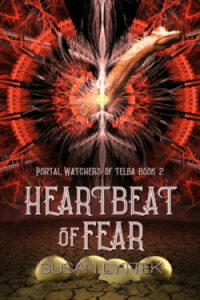by Susan A.J. Lyttek @SusanLyttek
In my latest YA series, the Portal Watchers, the prophet Nevv takes the three watchers under his tutelage. Ne-tel, Bern and Garth are all about half Nevv’s age and have barely an iota of his experience. But he doesn’t lord that over them. Instead, he reaffirms what they do have—the
dinosaurs and the mission to guard the creatures—and builds on that. He assures them that if they have the calling, the rest will come with time and effort. In the meantime, he will come alongside any time they need him.
I’ve had the opportunity lately to do a fair amount of judging other writers. Historically, too, I’ve taught, coached and evaluated writing for more than twenty years. Done in the proper mindset, judging your fellow writer can be one of the nicest ways to nurture and encourage. Like Nevv, those asked to judge might have twice the experience as the writers that they evaluate. But done in a “come alongside” spirit, both levels of writers will be blessed.
Six steps to nurture your fellow author(s) @SusanLyttek #writing #ChristianFiction #ACFW Share on X1) Think good thoughts. When you are judging other writers, assume the best. Let it be your starting point that they know their craft, they’ve honed their idea, and that they are giving you the fruit of diligent work.
2) Following on to the first point, look for areas to compliment. The plot is unique and compelling perhaps. The main character is imaginative. The story would work well as an audiobook. Every submission has something that you can tout as amazing. Every single one. (Trust me on this. I’ve used this method to assess papers submitted by 6th graders who believed that you only needed one punctuation mark per page.) We are all unique and created in the image of God, therefore whatever we create has a touch of that divinity. It’s up to the judge to find it and applaud it.
3) Correct gently. Use wording that softens the impact of the corrections you must make. For instance, “The rule is that you change paragraphs, start a new paragraph whenever the who, what, where, why or how changes. Perhaps you didn’t notice that the place is different in the second half of your current paragraph?”
4) Correct thoroughly. You can’t simply say “this is wrong” and leave it. No one learns the right way to employ the tools of grammar or plot development just by having a judge point out a mistake. As much as you have time for, demonstrate the proper way to express the author’s idea in a comment or in edits.
5) Express humanity. Sometimes a section might feel off and we don’t know quite why. Say exactly that. Sometimes an author will execute a turn of a phrase or develop a character in a way you wish you could have done. Say that too. Make it clear to the person being evaluated that while you may know a thing or two about writing, you don’t know everything. You are still learning and growing.
6) Lastly, praise the author. They took the time to enter a contest, making themselves vulnerable in the process. And while you won’t always put it on the page, this is a good time to pray for the writer and that their efforts honor and glorify God.
How, you might wonder, is the judge blessed through all of this? As you read and comment, many memories of your own writing journey will surface. You will remember those who came alongside for you, too. And seeing how much you’ve developed will cause you to praise and
thank God.
Which, honestly, is one of the best reasons for anything we do.
 Susan A. J. Lyttek, author of the Portal Watchers YA series (books 1 and 2 released August 2023), is an award-winning writer and blogger. Having spent a couple decades homeschooling and tutoring, she now seeks refuge and sanity in the world of story. Learn more about her other books and projects at www.sajlyttek.com.
Susan A. J. Lyttek, author of the Portal Watchers YA series (books 1 and 2 released August 2023), is an award-winning writer and blogger. Having spent a couple decades homeschooling and tutoring, she now seeks refuge and sanity in the world of story. Learn more about her other books and projects at www.sajlyttek.com.

Comments 2
Great advice. Thanks for sharing.
Portal Watchers sounds like a really good book for YA readers. Most of them are fascinated by dinosaurs.
Thanks for sharing your thoughts on judging contests.